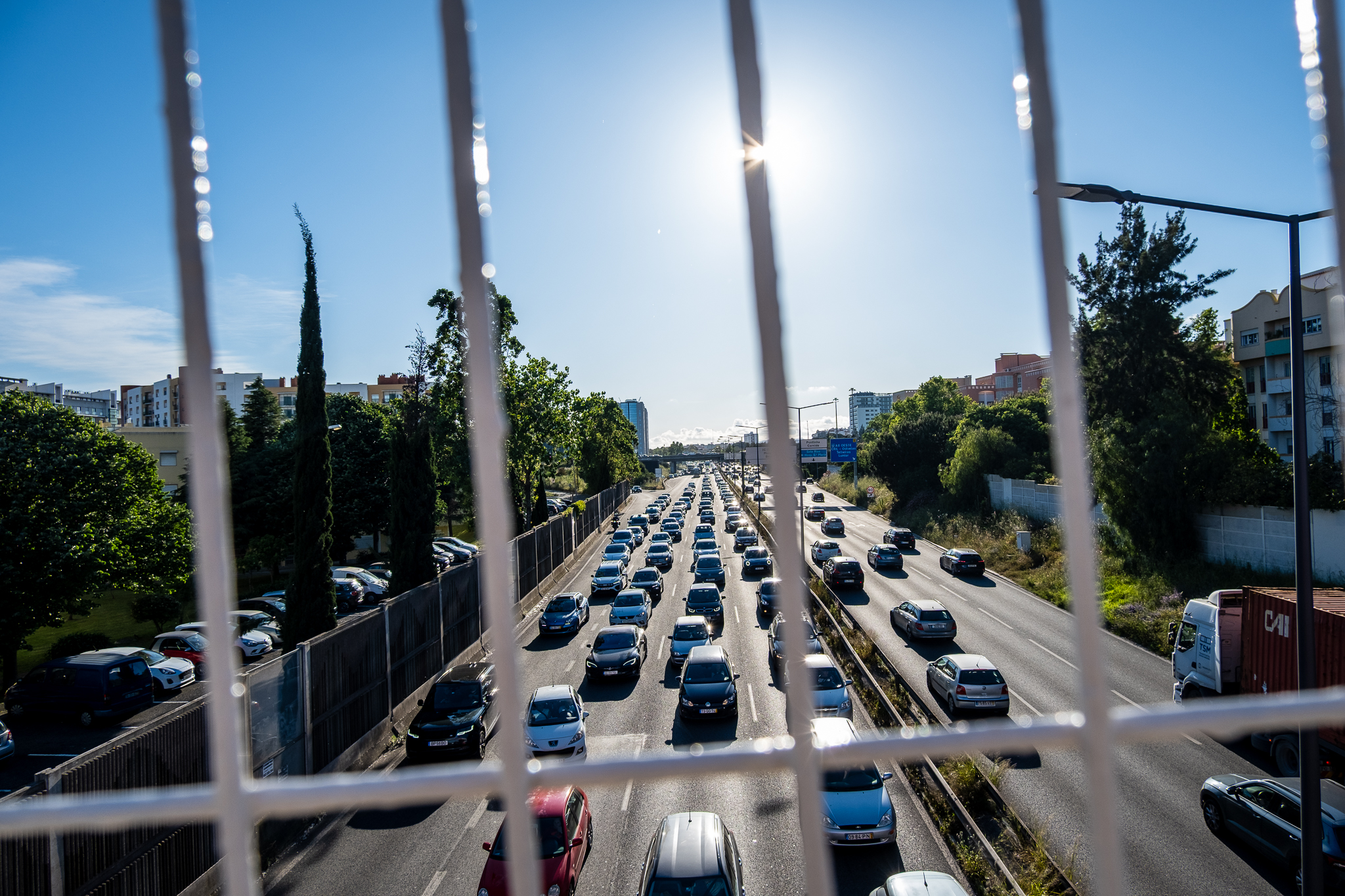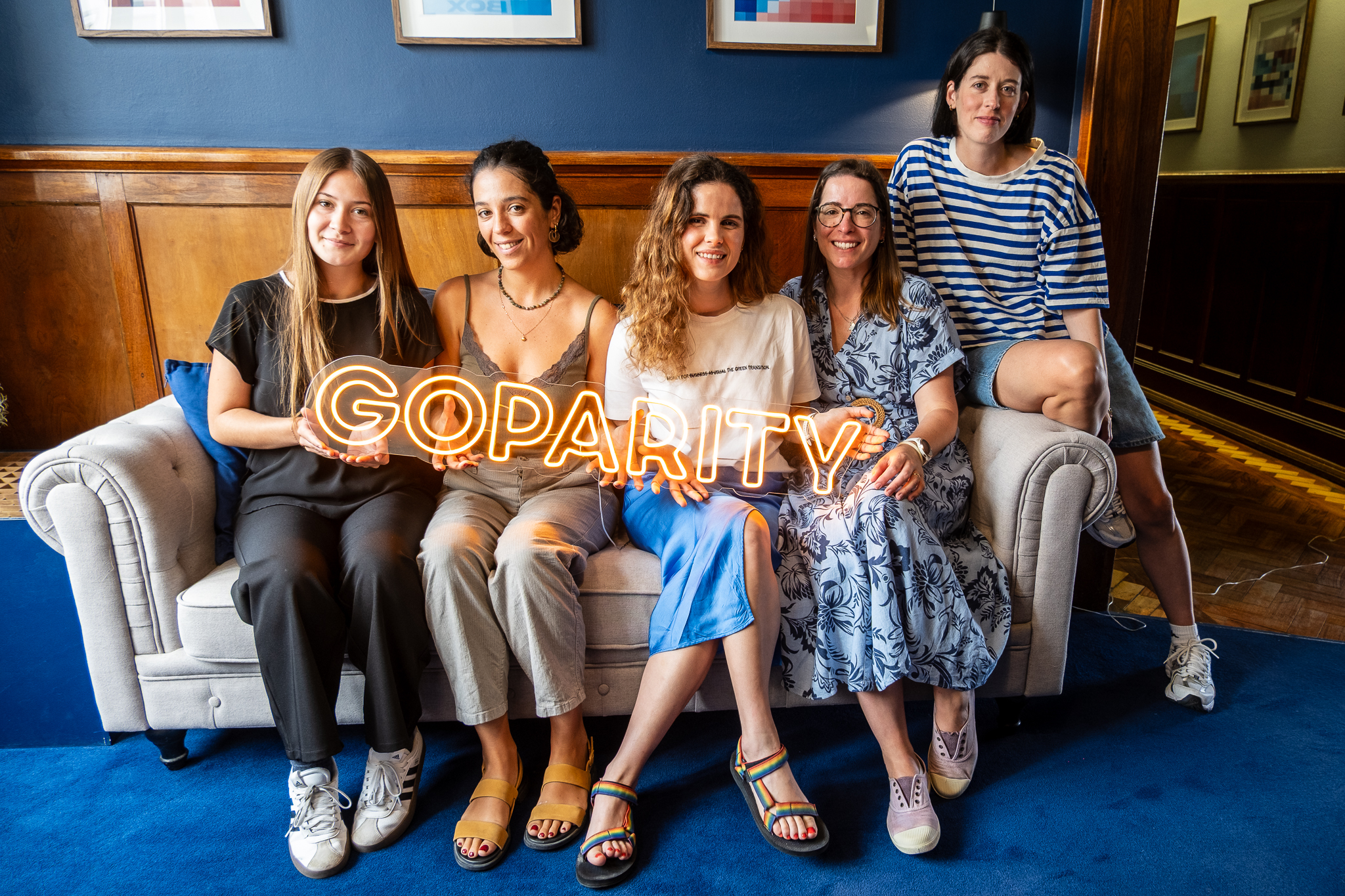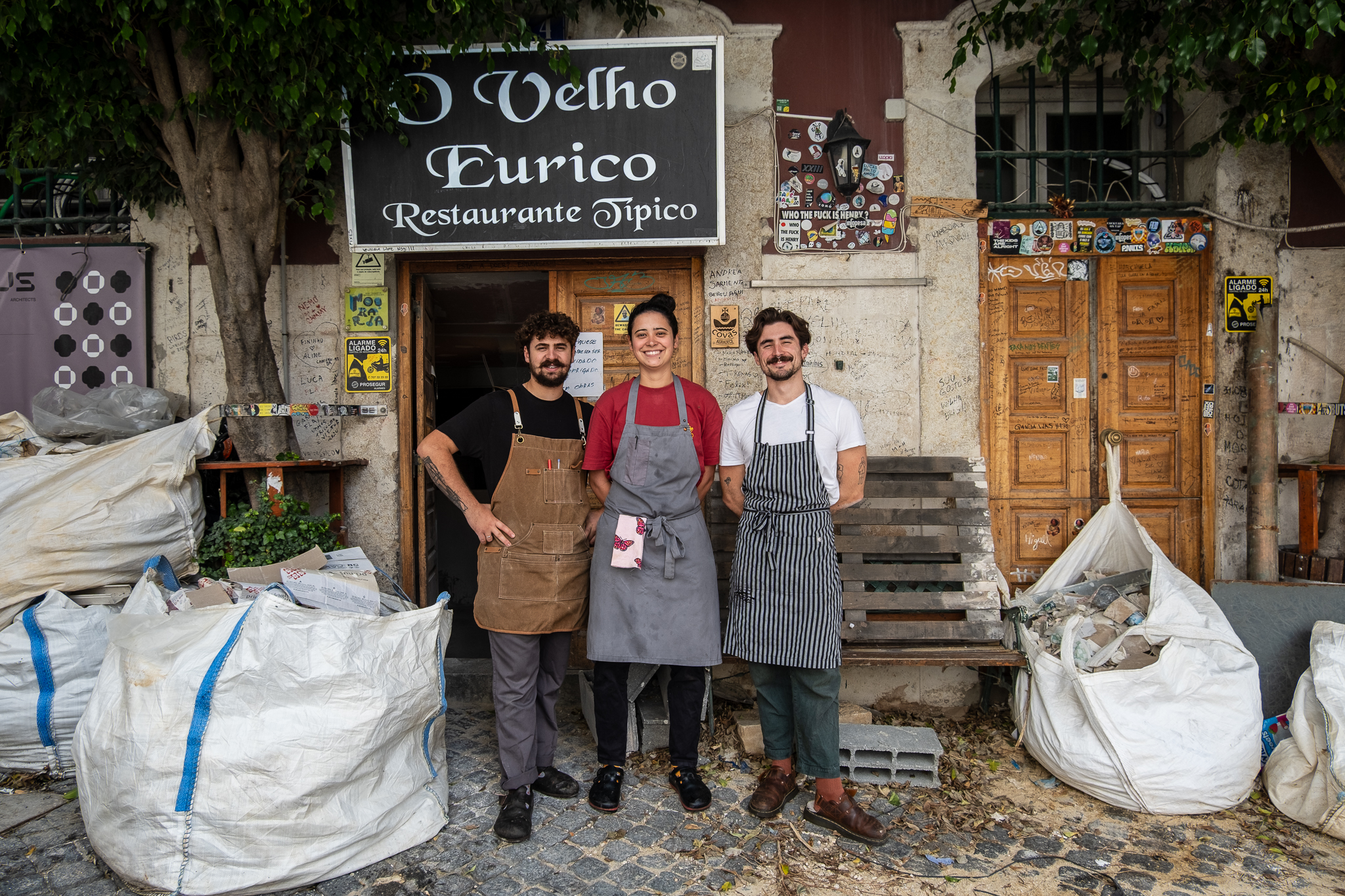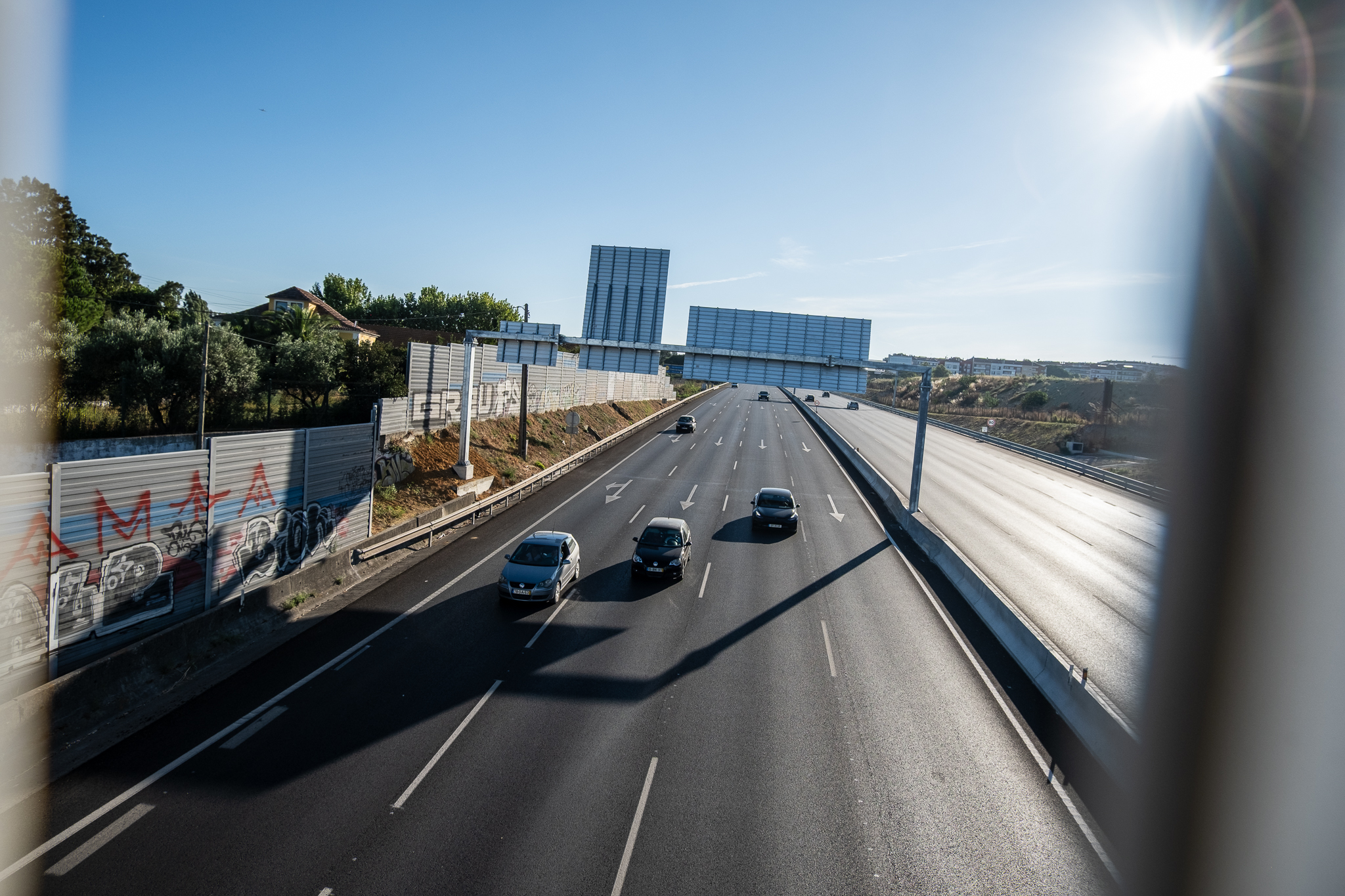In Lisbon, four start-ups have tested technology aimed at blind people. Two of these projects, Lumen and WhiteJacket, could really make a difference to pedestrian mobility for those who don't see the city in the same way.

It is with a technological device on his head that Tomás Delfim takes to the streets. He leaves behind the cane he normally uses to get around the city and to see what his lack of sight doesn't allow. Assisted by members of Lumen, the Romanian start-up that developed the equipment, Tomás is guided to a large garden area. This is where he moves around, testing the technology, which is still under development.
Lumen was in Lisbon to test your pedestrian navigation solution for the blindin an exercise coordinated by Lisbon City Council's Pedestrian Accessibility team, which involved a group of blind people and four technological proposals from four start-ups. In addition to Lumenparticipated the Spanish start-up OnRails with its WhiteJacket, the also Spanish 3Finery with the application LisNavand the Finnish Omni Audio. These four young companies participated in an acceleration program focused on universal accessibility, the Better Mobility Acceleratorpromoted by EIT Urban Mobility in the Portuguese capital.
Despite seeking to solve a single problem - pedestrian navigation for the blind and people with low vision - these start-ups present completely different technological solutions: the use of artificial intelligence for object recognition (LisNav), the communication of the presence of objects through sounds (Omni Audio), the use of stimuli through a sensory jacket (WhiteJackect) and a solution that replicates the orientation of a guide dog (Lumen). Tomás tried all four ideas, but Lumen's was the one that convinced him the most. "It allowed me to leave my cane behind. I didn't need to use it, I walked freely and with my hands free. In terms of functionality, I thought it was excellent." But he does point out some improvements to the equipment. "What I told them is that the less ostentatious it is, the more discreet it is, the better it is for us."

Lumen's product consists of glasses that help a blind person to perceive their surroundings. The device has five cameras that read the environment for the user, analyzing any obstacles; and, as the person walks, the device transmits a small vibration to indicate whether the path is clear or if there is a blockage, be it a vertical obstacle such as a post or a parking meter, or any interference at ground level such as a step or a hole.
Tomás Delfim is a journalist at Mensagem in Lisbon, a local newspaper also dedicated to the Portuguese capital, and it's there that he chronicles his experience in the first person. He gave a brief testimonial to Lisboa Para Pessoas (LPP) - who also accompanied him to test the product. "The vibration I get from the glasses must always be at the front of my head. So if I'm walking and I feel a vibration on the left, for example, it's because I have to turn in that direction. And when I turn, I get the vibration in the front again. That means I'm fine, I'm safe, I'm not going against anything."


In the street test, several people from Lumen moved around Tomás to test his behavior; they also placed a scooter in the middle of the path, but the glasses always successfully indicated the route. "The glasses also detect steps, like those little steps on the sidewalk. I thought it was great. But it's like I said, the smaller they are, the better"he says. "The weight of the glasses didn't bother me. But I was wearing them for 10 minutes. Maybe an hour would have made it uncomfortable." (The glasses currently have an autonomy of an hour and a half of use.) Tomás also highlights the fact that the glasses have few buttons and a tutorial on first use that helps the user adapt to the equipment and the stimuli they will receive.
Lumen still has work to do. The glasses they showed and tested in Lisbon are a prototype that still needs to be fine-tuned before the product can be marketed. For example, the glasses are not capable of recognizing pedestrian crossings drawn with two stripes - as there are so many in Lisbon - instead of the conventional zebra; if they don't, they give vibrating signals not to let Tomás cross the road. Lumen was founded in 2020 by Cornel Amariei, who was born and raised in a family where he was the only person without a disability - a context that made him realize the problem and how technology could provide answers. "We started from a simple problem: there are 40 million blind people in the world, but only 28,000 guide dogs. Why is that? Because a guide dog can cost up to 60,000 dollars and looking after a guide dog is a lot of responsibility for just one blind person. What we've done is replicate the main characteristics of a guide dog without the disadvantages that make the guide dog a non-scalable solution."

Lumen's glasses will be able to recognize the user's voice and the commands they give it. "A blind person can ask their guide dog to take them to the exit door or, if they know the way, even home. The dog pulls on the person's hand to lead them in the right direction, avoiding obstacles and keeping them safe. Lumen glasses can be asked for exactly the same commands and they will guide the person, but instead of pulling their hand, they give them the signals through their head. It's as if they were pulling the head in the direction the blind person should go. We've already tested it with more than 200 blind people"explains the head of the Romanian start-up. "Wearing Lumen glasses is like having a headset in your ear", points out. "In fact, this is the most advanced assistive technology in the world. It's autonomous driving technology reduced to something you can wear on your head."
Lumen's development is being supported by 9.7 million from the European Innovation CouncilThis is also why it was the most advanced product on test in Lisbon. Ringo was another of the testers and he was convinced. But he was also pleased with the idea of the WhiteJacket, from Spain's OnRails. While Lumen's proposal is good for outdoors, where there are obstacles of different heights, WhiteJacket's fits more into an indoor context, where there are people, walls and other things at torso level. Basically, the proposal consists of a white jacket with various sensors inside, capable of giving the wearer vibrating feedback when they are close to something. "Outdoors, I wouldn't use it, because I'm totally blind and it only warns of things at torso level. Outdoors you have things that are at torso level but also on the ground. So you touch it with your cane and move away. Inside, it's different"he says. "In a store, for example, people are more focused and don't stray too far. Instead of bumping into the person with the cane, you'll know they're there straight away and you'll naturally move away. Outside, people usually turn away"describes. "But indoors it's very useful and helps me dodge obstacles and people without bumping into them. I can use it with my walking stick and I can walk faster."

In general, it says, "the experience was very good and I hope they can build on it". The WhiteJacket prototype that OnRails was showing in Lisbon still needs to be improved. For example, the weight is something that needs to be reduced to make the wearing and using experience easier and more comfortable. Also, the backpack they have today, which houses all the device's processing power and battery, needs to be removed. But both Ringo and Tomás enjoyed the experience, and believe that it could be equipment that would help them overcome the mobility obstacles they encounter today in cities like Lisbon. For Ringo, "Lisbon is an accessible city. It could be better, but it could also be worse." You know Madrid, Paris and Brussels, and for you nothing beats the Spanish capital. "Paris and Brussels are more or less on the same level. Madrid is the dream. It has audible signs everywhere, it doesn't have the sidewalk, the sidewalk changes when you have a staircase in front of you, you have guides who will take you to the crosswalks everywhere. It's so much better." Tomás also dreams of a more accessible city. "There are places where there isn't the best accessibility, both in terms of the ground, the unevenness, things leaning against walls, like electricity boxes and poles that force you to go almost on the road, cars and scooters on the sidewalks..." And some of these places are areas of Lisbon that you can't avoid - "I need to go to those places". Tomás travels daily between the municipalities of Lisbon and Vila Franca de Xira by train. "On public transport, it's relatively quiet. Even if you don't know a station, there's usually always someone to help."

The blind and partially sighted people involved in this product and prototyping event were able to try out the different solutions, with the aim of the start-ups learning lessons for the development of their products. On the other hand, this experimentation allowed technicians from the municipality's Pedestrian Accessibility Plan to gain a better understanding of the future of technologies to support accessibility for people with reduced mobility, specifically how these might relate to the planning of the city's pedestrian infrastructure.
As stated by Councillor Ângelo Pereira, who is responsible for pedestrian accessibility, "this action is part of the new impetus we are giving to Lisbon's Pedestrian Accessibility Plan, which foresees the need for continuous innovation and updating of good practices for a more inclusive and higher quality pedestrian experience for all citizens, without exception". He adds: "The most visible result of what this Plan has already allowed us to do is in the continuous renovation of accessible pedestrian crossings that we continue to implement throughout the city. However, the road to building an accessible Lisbon is still long and we are working on every detail."











